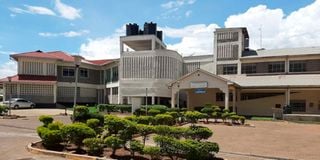Hospital to set up vital bone marrow unit

Jaramogi Oginga Odinga Teaching and Referral Hospital (JOOTRH) where Mr Daniel Muthama practices as a biomedic.
What you need to know:
- Under the partnership, doctors and nurses will be trained in bone marrow transplant.
- The county will be guided to set up a sickle cell rehabilitation centre, a mental health clinic, a newborn baby screening unit and a 25 bed ICU bone marrow transplant unit. Kisumu is one of the counties in Kenya with a high burden of sickle cell.
Sickle Cell Disease and Haemophilia patients are set to benefit from a Bone Marrow Department to be set up at Jaramogi Oginga Odinga Hospital in Kisumu.
This follows an agreement between Fortis Hospitals in Delhi, India and Kisumu County to strengthen sickle cell management in the county.
Under the partnership, doctors and nurses will be trained in bone marrow transplant and the county guided to set up a sickle cell rehabilitation centre, a mental health clinic, a new born baby screening unit and a 25 bed ICU bone marrow transplant unit.
Kisumu is one of the counties in Kenya with a high burden of sickle cell.
Governor Anyang Nyong’o said one in every five newborns in the county is affected by sickle cell.
“This translates to about 8,000 children born with sickle cell trait in the county annually. Every year about 600 children have a severe form of the disease,” said Governor Nyong’o.
A majority of children with SCD die undiagnosed, with 50-90 per cent dying before their fifth birthday. Approximately 80 per cent of individuals with SCD are below 15 years of age.
This comes ahead of the Sickle Cell Disease and Haemophilia Conference to be held from September 12 to 16 in Kisumu City.
“We are taking a lead to, in collaboration with the national Ministry of Health, call key stakeholders in the country and around the world to discuss and contribute to the strengthening of the management and control of SCD and haemophilia,” he said.
The event shall bring together stakeholders from various sectors including clinicians, scientists, individuals and affected families, health policy experts and makers, advocacy groups and any other individuals working or interested in SCD and haemophilia.
However, as these efforts are being made by the county, the shortage of crucial drugs used in the management of the disease in the public hospitals continues to bite.
The basic drugs, Hydroxyurea and Paludrine, have not been available in Kisumu since February.
Caregivers have lamented the shortage of these drugs causes SCD victims to fall ill often.
Michele Omullo who has been living with Sickle cell disease for 27 years said the drugs are important in managing painful crises.
“The drugs help free flow of the sickle cells in the blood vessels. Without these drugs, the cells clog within the blood cells therefore causing extreme pains on the joints and other parts of the body,’ said Ms Omullo.
She explained that in worse cases patients suffer from acute chest syndrome that puts the person to depend on artificial oxygen.
‘If the crisis is not handled in time, the victims can be in hospitals for weeks,’ she said.
Veronica Bitta, a mother of three, is worried as long as these two drugs are available in public hospitals. Her last born son is suffering from Sickle Cell Disease.
‘All these county government hospitals don’t have these crucial drugs. We know these because we are in support groups with Sickle Cell Disease where people are asking for drugs,’ said Mrs Bitta.
She added: ‘The last time we had consistent supply of the SCD drugs was late last year. By February they ran out.’
Now the Sickle Cell warriors can only get the drugs from a private chemist.
A single drug goes for Sh55 to Sh59. Adults take two capsules on a daily basis.
‘The drugs are costly for us. Some of us are jobless and don’t have medical cover to afford these drugs,’ she said.
Analysis of data available at JOOTRH reveals that on average a sickle cell client suffers 5 episodes of crises annually and 5-10 days of hospitalization per episode.





